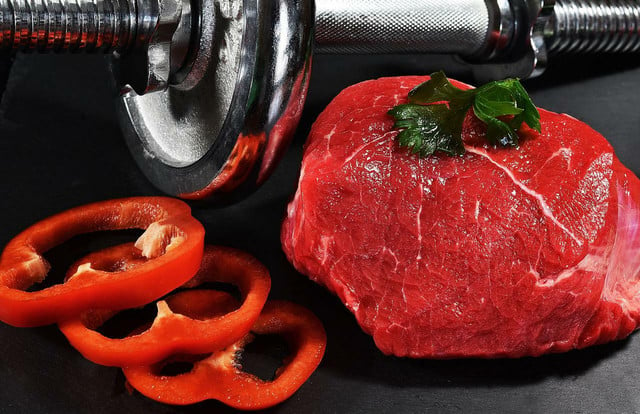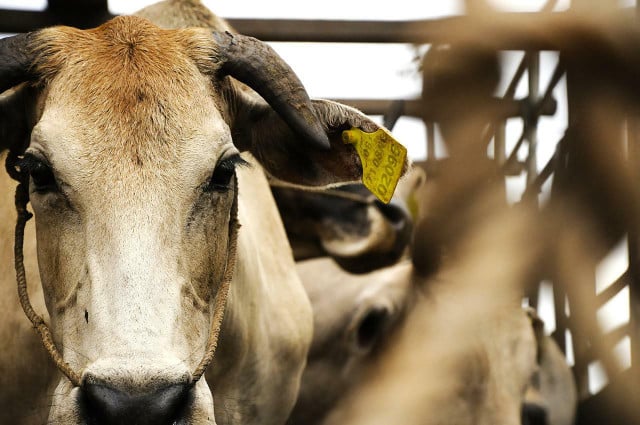The myth that being vegan is not masculine has been around for ages. Find out the consequences of this gender stereotype and if it has a scientific foundation.
Is eating meat a symbol of masculinity in today’s society? This year’s Wimbledon tennis final in the UK would suggest that it shouldn’t be. Both finalists, Novak Djokovich and Nick Kyrgios, are world-famous vegans.
This was Djokovich’s seventh time winning the title. He attributes his success to his gluten-free, plant-based diet. In fact, there are many fit and famous men emerging to eradicate the notion that being vegan is not masculine.
A range of famous vegetarians and famous dads now publicly proclaim their love for — and the benefits of — plant-based diets. This opposes the age-old myth that meat is masculine and has garnered these men the title of “hegans” — masculine men who do not eat meat. Their image is very much one that says being vegan is also manly. However, despite these high-profile examples and the insistence of many others, the belief that being vegan is not masculine still prevails in western society.
Being Vegan Is Not Masculine in America

(Foto: CC0 / Pixabay / zuzyusa)
Eating meat has health, societal and ecological consequences. As authorities, health experts and environmentalists worldwide battle to reduce human consumption, many Americans still can’t get enough. The U.S. Department of Agriculture (USDA) warns that we far exceed the amount of meat recommended by national dietary guidelines. One million chickens are eaten in the US every hour, and the amount of meat we consume has increased by 40 percent in the last 60 years.
Only five percent of Americans are vegan, and a further six percent consider themselves vegetarian. Most of these are women, who eat about a third less meat than men and 42 percent less beef. Recent research shows that men are still less open to becoming vegetarian than women. We already know that food choices are multi-faceted and influenced by numerous factors — like culture, society, environment and individual preferences — but does gender stereotyping really play a role?
Why Is Being Vegan Not Considered Masculine



(Foto: CC0 / Pixabay / Pexels)
Until the early 1870s, after the civil war, men and women typically ate the same kinds of food. Shifting social norms saw women enter the workplace and begin dining together without men. These new norms accompanied updated restaurant menus, which now boasted “female foods” like salads and fruit dishes.
A massive cookbook campaign in the early 1900s, advocating women’s needs to satisfy men’s appetites, deepened the divide between “dainty” female and “adventurous” male foods. Some women even ordered steaks on first dates to signal they would not inflict female foods on their future husbands. And so, the divide emerged as our perceptions evolved to judge foods still gendered as male or female over a century later.
Reports from The Washington Post, among others, strongly indicate that gender stereotyping still plays a role in dietary choices for many men today. These reports highlight how the meat industry’s marketing campaigns, linking meat and masculinity, have heavily contributed to the gulf between male and female vegans and vegetarians. Media and advertising significantly impact public perception, and the idea that being vegan is not masculine is seen worldwide.
Researchers consistently find links between meat and perceived masculinity. Some men report a visceral connection with slaughter-derived meat, while others fear damage to their reputations if they remove meat from their diets. What men think of men seems to play a prominent role. Other studies show that some men who are insecure about their masculinity boost their self-perception by eating red meat because it is broadly perceived as masculine.
A general theme in all this research is that men, and some women, see meat as a way to build muscle and enhance stereotypically male qualities like virility, strength and sexual prowess. In a startling study by non-for-profit No Meat May, 73 percent of male respondents said they’d rather reduce their life expectancy by up to 10 years than give up eating meat. Science suggests they might have to.
Meat, Masculinity & Men's Health



(Foto: CC0 / Pixabay / 12019)
Men in the US have higher rates of life-threatening diseases and have long been outlived by their female counterparts. Alongside physiological and behavioral factors, Harvard has identified diet as a potential reason for these trends. Some researchers have identified the stereotypical view of masculinity and subsequent over-consumption of meat as contributing to these gender differences in health outcomes.
Studies repeatedly highlight the association between red meat consumption — particularly processed meat — and increased risk of mortality and chronic disease. Red meat compounds are known to cause a disease pathway involving the gut microbiome that leads to cardiovascular disorders, among others.
Regular consumption of beef, pork and other types of meat is now scientifically linked to 25 different disorders, as well as the rising incidence of obesity and chronic inflammation. The International Agency for Research on Cancer also highlights red meat as a known human carcinogen. Yet somehow, society maintains the perception that being vegan is not masculine. Let’s take a look at what the science has to say.
Virility, Strength & Sexual Prowess — The Science



(Foto: CC0 / Pixabay / satyatiwari)
Terms like “rice eaters” and “soy boys” are well-documented terms used to describe so-called weak, effeminate, plant-eating men in society and the media. Our preconceived notions of masculinity — including massive strength, high testosterone, bulging veins and muscular bodies — are closely linked to carnivorous alpha males. Strangely, science would indicate that we have these ideas the wrong way around.
Research tells us that there are no significant differences in testosterone levels between omnivores and men on plant-based diets. In fact, the traditional high protein, low-carb diet appears to decrease testosterone levels. Furthermore, plant-based diets may reverse that pattern and boost testosterone.
As for muscle, plants have gone many rounds with meat in multiple research studies that show no advantage for meat-eating athletes. In fact, trends show that vegan and vegetarian athletes display improved endurance and strength.
Meat-free diets are also associated with a lower risk of prostate cancer and erectile dysfunction. Researchers now argue that plant-based diets actually contribute to healthier, more positive masculinity, encouraging changes in behavior that include paying more attention to nutrition and improved physical and mental well-being.
Modern Masculinity & Meat



(Foto: CC0 / Pixabay / asompoch)
New guidelines from the American Psychological Association warn against “traditional masculine ideology.” Aside from meat, the concept is associated with anti-femininity, achievement, strength, adventure, risk and violence. Leading APA members from the Society for the Psychological Study of Men and Masculinity warn that many American boys are socialized and conditioned to conform to our preconceived ideas.
Americans’ views on what constitutes masculinity reportedly differ according to political party, gender and race. Many men report they feel at least some pressure to engage in activities typically associated with traditional masculinity ideology. Americans report generally placing less importance on femininity than they do on masculinity. So how men are perceived seems to matter.
Unsustainable Stereotypes



(Foto: CC0 / Pixabay / RyanMcGuire)
According to Forbes, the US is close to shattering the misconception that being vegan isn’t masculine. New forms of masculinity are emerging that value holistic well-being, environmental health and domesticity. Research shows that men who identify more with new concepts of masculinity consume less meat, have a weaker attachment to it and are more likely to give it up in the long run.
The devastating effects of meat consumption extend well beyond men’s health. It’s also unsustainable and harmful to the planet. This gender stereotype could become a problem for everyone if we do not work to change our current ideologies. Livestock production is a leading driver of the environmental crisis and contributes significantly to water consumption, deforestation, soil destruction, water contamination and greenhouse gas emissions.
If our current rate of meat consumption is unsustainable, so is the traditional view that eating meat is masculine. One study has indicated that by stopping consuming meat and dairy, we could reduce land cultivation by 75 percent while still feeding the entire planet’s population. The assumption that being vegan is not masculine has no scientific basis. It appears to serve no positive purpose for men’s well-being or the planet’s health.
The planetary health diet approach aims to fix our broken system by unifying global sustainability and individual well-being. Its motto is “sick planet, sick people.” The diet’s primary advocate, the Planetary Health Alliance, was founded in 2016. Its members extend to over 200 research institutions in over 40 countries. Our misconceptions about meat and masculinity are a big part of the sick people and planet we need to address.
There are many things you can do to save the ocean and the planet. Not eating meat is one of them. If you want to gradually eliminate meat from your diet or just eat it a little less, check out pescatarian diets and flexitarian diets. You could also try some tasty new vegan meat options: vegan ground beef or impossible burgers are a good start — see if you taste the difference!
Read more:
- What is Environmental Racism? A Definition and How to Fight It
- Can Dematerialization Help Build a More Sustainable World?
- Take Action: 15 Everyday Ways to Combat Climate Change
- Human-Environment Interaction: Definition & Examples
Do you like this post?








